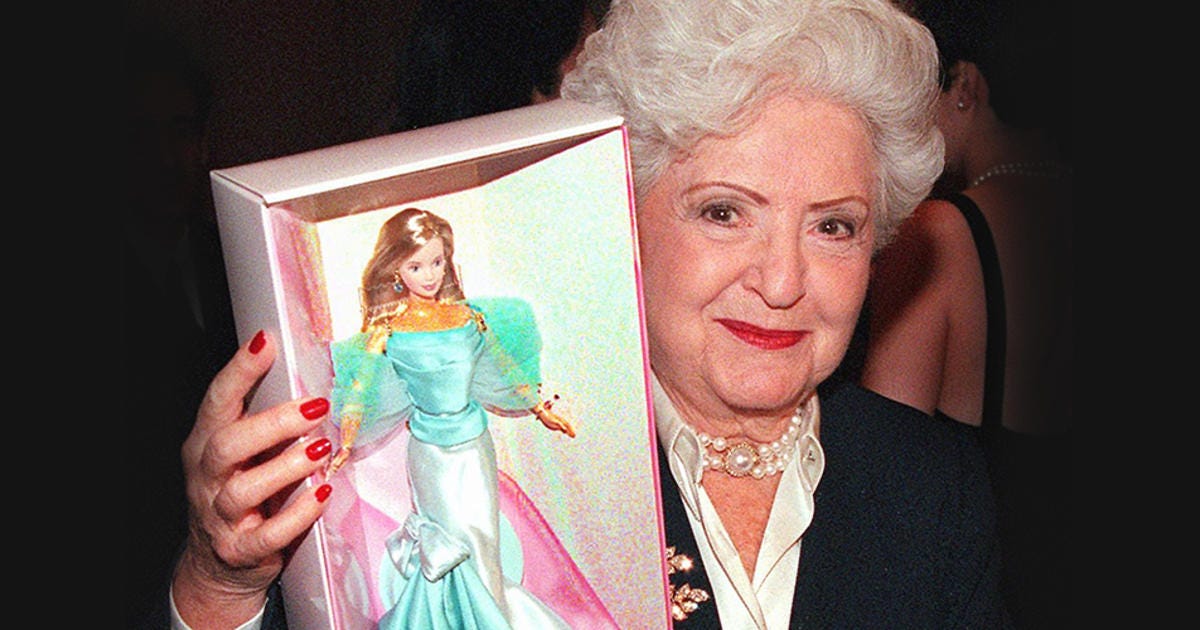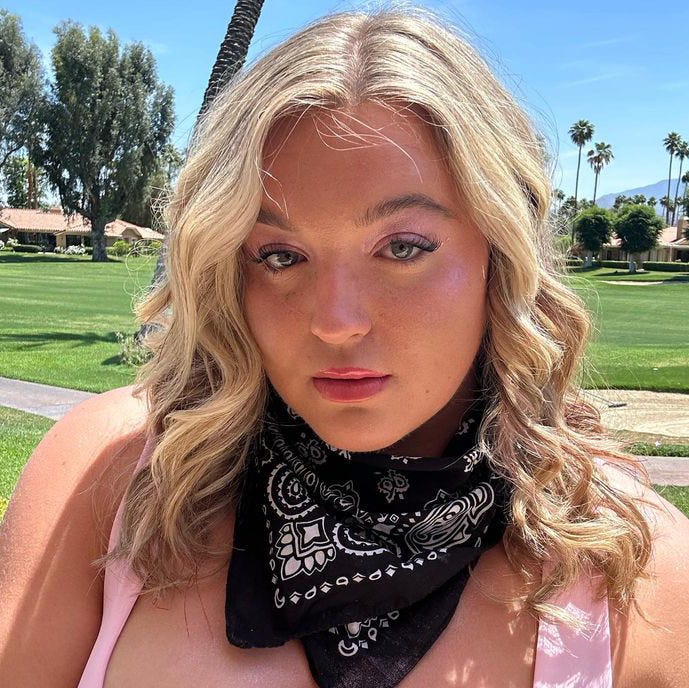💖 Finding Judaism through Barbie
"Barbie was the first step in this young woman’s Jewish journey."
If you’ve been on the Jewish Internet lately, you’ve seen every organization talking about Barbie’s Jewish origins in anticipation of the movie coming out today. Now, some of you might already know it, but don’t click away just yet! In this week's Drop, I've included a special story from my friend, Chloé, that, when I first heard it, inspired me to start writing this newsletter and to seek out and share other incredible Jewish stories and perspectives. Have an interesting or inspiring Jewish story? Reply to this email to be featured!
But first, a little history…
The creator of Barbie was a Jewish woman named Ruth Handler, whose family fled antisemitism in Poland. Ruth was born in Denver in 1916 and still faced antisemitism in her home country, never forgetting how police officers had stopped her car in Denver to make antisemitic remarks.
She met her husband, Izzy Handler, at a Jewish youth dance and the pair eventually moved to LA, he a shy artist and she a bold businesswoman (or as we millennials say, #girlboss). By the 1930s, she convinced Izzy to change his name to Elliot to avoid antisemitism.
The pair began making dollhouse furniture with their friend Harold “Matt” Matson. After gaining success, they formed Mattel, a combination of Matt and Elliot’s names. In 1946, Ruth became the president of Mattel.
Ruth was inspired to create Barbie when one day, while watching her daughter Barbara (Barbie’s namesake) play with paper dolls, pretending they were adult women. In the 1950s, the only dolls on the market were baby dolls. Mattel dismissed Ruth’s original designs, saying that mothers would never buy their daughters a doll with breasts. But Ruth, the badass she was, kept pushing for her idea and Barbie was born, decked in a black-and-white swimsuit and heels (because who doesn’t wear heels to the beach or pool?) in 1959.
Mattel sold 350,000 Barbies in its first year. Ken, Barbie’s boyfriend, was created in 1961 and was named after the Handlers’ son. That’s not weird at all.
Throughout their lives of fame and success, Ruth and Elliot never forgot their Jewish roots. Together, they founded LA’s Temple Isaiah and became longtime contributors to the United Jewish Appeal.
For some, the Barbie doll represents feminism and the possibility to be anything you want to be. For others, she represents sexism. For some Jews, she represents identity and the American Dream. For other Jews, she represents assimilation. In 2003, she was temporarily banned in Saudi Arabia, who said, “Jewish Barbie dolls, with their revealing clothes and shameful postures, accessories and tools are a symbol of decadence to the perverted West.” So she must be Jewish!
Whatever you think of Barbie, let us not forget and celebrate the force of the Jewish woman who created her.
Finding Judaism through Barbie
By Chloé Laverson
I picked up a lot of side gigs in college to fund my DoorDash addiction and sorority apparel fund. And every Sunday at 8 am, I’d pull into my synagogue’s parking lot a little bleary-eyed, clutching a dirty chai in my left hand and The Newish Jewish Encyclopedia in the other. Utah’s Jewish population is SMALL, and Kol Ami, the local reform/conservative temple, relies on Hillel’s ever-revolving door of college students to keep their Hebrew school staffed.
My third and final year of teaching was unusual; students were restless, adjusting to a “new normal” in the second year of the pandemic. I taught seventh grade, and I loved it. I enjoyed having meaningful conversations about Jewish identity, discussing our favorite Jewish celebrities, and exploring the differences between Sephardic, Mizrahi, and Ashkenazi Jewish customs.
At the beginning of the academic year, I always asked, “Why are you having a b’nai mitzvah?” And the answers stayed consistent year after year: “I want a cool party,” or “My parents are making me,” or my personal favorite, “My Mom said if I have a bar mitzvah, she’ll buy me a PS5.” And every time I rolled my eyes (in front of them––they were 13, I had to match their sass to gain respect and authority).
As we progressed through the year and more students were absent because of ski season, the answers started to change.
“I want to have a bat mitzvah because my grandma wasn’t allowed to have one.”
“I want to have my bar mitzvah because I will be a part of something bigger.”
“I want to have a bar mitzvah because I love being Jewish, and I want my friends from school to see it.” This was PS5 kid, and I was really proud (of myself mostly).
Some students are tougher to crack, but I faced my biggest challenge from a young woman who resented her Jewish identity; let’s say her name was Sarah. She was the only Jewish student at a school of 1000+ students; thus, the burden of representing all Jewish people fell upon this thirteen-year-old Sephardic Jew of Color. Being a young Jewish person in Utah is not easy. There are around 6,500 Jews in Utah, making up .2% of Utahns, and most schools have a majority Mormon student population.
Sarah was bullied for being Jewish at school, and her peers constantly questioned her Jewish identity because she didn’t fit their stereotypical image of Jewishness. And our first 1:1 conversation, she told me she no longer wanted to be Jewish, let alone have a “stupid bat mitzvah.” It (obviously) broke my heart, and I made it my mission to help her explore her Jewish identity.
I tried everything––we learned about Moroccan Sephardic food and culture (we had this identity in common), I made playlists of current hit songs written and performed by Jews, and I asked my friend who’s a Jew of Color to speak with her. None of it worked until Barbie.
I taught a piece of Jewish culture every week and was finally going to introduce my class to Barbie’s very Jewish history. In preparation, I went to Target (a favorite pastime of mine) and picked out a Barbie that looked a lot like Sarah. I put it in my cart. I had an idea.
Sarah was shocked to learn that Ruth Handler, the daughter of Jewish Polish immigrants, invented Barbie. I discovered my student had played with Barbies all growing up and had a particular infinity for the Fashionistas line. She was excited and surprised. She told me the following week she had brought her Barbies out from whatever basement hellhole they had been banished to.
Let me be clear; Barbie did NOT help her find her Jewish identity or solve the bullying problems, nor is Barbie (or the doll’s history) perfect, but Sarah saw a “Jewish woman” or even a friend who looked like her in the doll. Barbie was the first step in this young woman’s Jewish journey. When I watched her bat mitzvah (on Zoom), she told the entire congregation she was proud to be Jewish, and now she’s a Hebrew school Madricha.
I hope this summer of Barbie sparks joy and that this article reminds you none of this would’ve been possible without a Jewish woman. And that’s a slay.
I keep up with my students on their parent’s Facebook. One of my students was gifted a car for her 16th birthday. In case you were wondering, I’m still spiraling.
Chloé Laverson is the Founder and CEO of Creative by Chloe, a social media marketing agency, and the social media manager for popular podcasts, MuggleCast and #Millennial. She's a proud Moroccan-French Jew, and Barbie enthusiast. On her personal social media channels, Chloé creates content that heals her inner child and brings a little magic to every day. Follow @chloelaverson for more!




Great article - we’ll done, humorous in parts - Chloe’s piece so fascinating as well. The whole Barbie doll thing has always been, to me, a bit confusing and a bit controversial. Over the years they added careers, diversity, etc. but when she first came out, or when I was very young, she was a blonde waspy thing with pointy tits. Don’t get me wrong, I had Barbies and a lot of clothes for them. There was a Midge too with dark hair because that was the response to diversity marketing in the early sixties and appeasing the little girls who did’t look like blonde Barbie — we’ll change the hair color! Then at some point Barbie got a wheelchair, wore glasses, got a degree, dif color skin, etc. it’s all so fascinating - but never knew she had Jewish roots - I mean she did’t look Jewish hahahah (yes I did just write that!) oh my - - just gotta say - I love you and your Drop.
The Barbie rage these days is of course because of the newly released film about Barbie and Ken. Note: this is not a film for very young ones. If Barbie has Jewish roots, via her creator, then so too does the J. Robert Oppenheimer film. Oppie, as he was called, had Jewish roots but did not practise or live his Jewishness. But so too was Albert Einstein, who suggested that such a weapon as the A bomb could be fashioned but who was not involved in the building of the bomb because of the FBI worry about his left-leaning sympathies.
We readily take what gifted people offer but often do not know or realize the background of those who have made such contributions available to us.